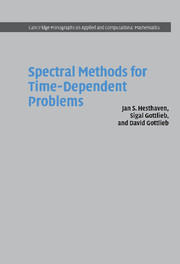
-
Select format
-
- Publisher:
- Cambridge University Press
- Publication date:
- 04 December 2009
- 11 January 2007
- ISBN:
- 9780511618352
- 9780521792110
- Dimensions:
- (228 x 152 mm)
- Weight & Pages:
- 0.59kg, 284 Pages
- Dimensions:
- Weight & Pages:
You may already have access via personal or institutional login
Book description
Spectral methods are well-suited to solve problems modeled by time-dependent partial differential equations: they are fast, efficient and accurate and widely used by mathematicians and practitioners. This class-tested 2007 introduction, the first on the subject, is ideal for graduate courses, or self-study. The authors describe the basic theory of spectral methods, allowing the reader to understand the techniques through numerous examples as well as more rigorous developments. They provide a detailed treatment of methods based on Fourier expansions and orthogonal polynomials (including discussions of stability, boundary conditions, filtering, and the extension from the linear to the nonlinear situation). Computational solution techniques for integration in time are dealt with by Runge-Kutta type methods. Several chapters are devoted to material not previously covered in book form, including stability theory for polynomial methods, techniques for problems with discontinuous solutions, round-off errors and the formulation of spectral methods on general grids. These will be especially helpful for practitioners.
Reviews
'The book is excellent and will be valuable for post-graduate students, researchers and scientists working in applied sciences and mainly in the numerical analysis of time-dependent problems. The thoroughness of the exposition, the clarity of the mathematical techniques and the variety of the problems and theoretical results that are presented and rigorously analyzed make this book a primary reference in the advanced numerical analysis of partial differential equations.'
Source: Mathematical Reviews
Contents
Metrics
Altmetric attention score
Full text views
Full text views help Loading metrics...
Loading metrics...
* Views captured on Cambridge Core between #date#. This data will be updated every 24 hours.
Usage data cannot currently be displayed.
Accessibility standard: Unknown
Why this information is here
This section outlines the accessibility features of this content - including support for screen readers, full keyboard navigation and high-contrast display options. This may not be relevant for you.
Accessibility Information
Accessibility compliance for the PDF of this book is currently unknown and may be updated in the future.


